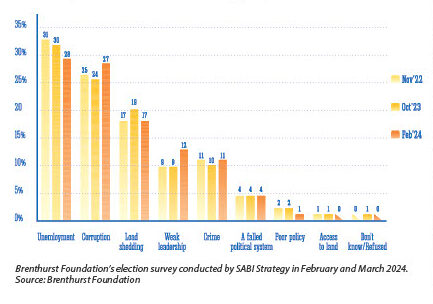On May 29, 2024, South Africa’s general elections produced a little anticipated outcome, with no single political party winning the parliamentary majority. Receiving only 40.2% of the votes, the African National Congress (ANC)—which had ruled the nation non-stop since the end of apartheid 30 years ago—could no longer keep hold of its power.
The voters had spoken. To address their demand for political change, the ANC agreed with the numerous opposition parties to form a ‘Government of National Unity’ (GNU), with President Cyril Ramaphosa providing them with cabinet positions.
ANC FAILURES
For years if not decades, the ANC had been criticised for failing to address various socioeconomic challenges. Corruption, unemployment and electricity supply issues were among people’s top concerns.
Individuals connected to powerful politicians had been involved in corruption, eroding public trust in the government. In one of the largest scandals of the previous decade, the Gupta brothers were accused of pursuing a project of “state capture” amounting to billions of US dollars, in collaboration with former president Jacob Zuma, who ultimately resigned. The Zondo Commission Report identified deliberate acts of state resources looting, but no action was taken. Corruption also flourished at the local level, affecting the implementation of South African municipalities’ policies.
Policies also failed to maintain economic growth at a sufficient level, with GDP decelerating in real terms from 1.9% in 2022 to 0.6% in 2023. This weak record came as a result of power shortages, transport sector constraints, and lower prices for gold and platinum group metals on global markets.
As a result, jobless figures stood around 33% (46% for the youth) as of Q1 2024, placing South Africa among the countries with the highest rate of unemployment in the world.
The country also boasts one of the highest levels of income inequality. In 2022, the World Bank noted that 80.6% of its financial assets were owned by the top 10% of South Africans.
Poverty and wealth disparity are among the key factors contributing to high crime rates, where South Africa also features prominently in international rankings.
IDEOLOGICAL OPPOSITES AND POLITICAL DEXTERITY
Featuring 75 members from 11 parties, the new cabinet is the largest since the advent of democracy. This entirely new political configuration has necessitated reconciling very different ideologies and policy orientations.
The ANC’s platform focuses on economic justice, social justice and anti-corruption, while the DA advocates for market-friendly policies and good governance. The Inkatha Freedom Party (IFP) focuses on cultural preservation, social conservatism and rural development while Patriotic Alliance, a newer political party, commits to fight crime, develop the economy and unite the nation.
The ideological divergences between the ANC and DA are so deep that investors and credit rating agencies have expressed scepticism about these parties’ ability to overcome them easily. For example, the ANC had increased expenditure on social grants just before the election, while the DA promised to reduce some of them, alongside other ANC black empowerment policies.
The sustainability of the coalition government, however, will largely depend on the dexterity and competency of the key political figures.
President Cyril Ramaphosa’s long political experience could be an asset to handle complicated political issues, while Gayton Mckenzie of the Patriotic Alliance might be well-positioned to tackle crime and support economic empowerment, which have long been central themes of his agenda.
FIRST MEASURES
Just two weeks after the election, the parties signed a Statement of Intent that outlined priorities for the new administration. It aims to foster rapid, inclusive and sustainable economic growth as well as job creation, land reform, transformation, livelihood support and infrastructure development.

These priorities have been reflected in the GNU’s very first steps. At their first meeting after the elections, the government and business have agreed to actively address, over the next 12 to 18 months, such pressing challenges as electricity outages, poor logistics and high crime.
Among other pro-employment measures, the Department of Home Affairs—now branding itself as “a powerful engine for economic growth”—has committed to urgently addressing the backlog in work permit processing. A special team was formed and 92,886 permits out of 306,042 were reportedly processed in just a few weeks, a 30% reduction. The new government contends that boosting the availability of scarce skills in the labour market is a key strategy for job creation.
The new government will avoid purchasing new houses and offices for cabinet and parliament members, displaying a commitment to responsible spending
Meanwhile, a reform of public-private partnerships (PPPs) has been adopted to stimulate investments in critical sectors like energy and infrastructure, and alleviate the financial strain on the public sector.
Symbolically, the new government will avoid purchasing new houses and offices for cabinet and parliament members, displaying a commitment to responsible spending. Additionally, government officials will be required to use existing furniture.
CAUTIOUS OPTIMISM
Many South Africans are cautiously optimistic about the new government’s setup, even though the shift has introduced unfamiliar political uncertainty.
Professor Susan Booysen, a political analyst, acknowledged the contradictions in the positions of the various parties. She emphasised that they need to clearly understand their roles: “It’s very important that the [GNU] parties come to accept and show acceptance that this is a new entity they’re acting for,” Eye Witness News quoted her as saying.
While much of the old government programme will remain in place, Booysen also pointed out that the new government cannot simply be a continuation of the previous one. “Where there is a need for change, where there have been deficits, where the poor policies have been falling short, it must be very clear that the old orders, instructions, policies are not guaranteed to be put in place again,” she explained.
By Patrick Mzungu
Stay informed anytime! Download the World Economic Journal app on the App Store and Google Play.
https://apps.apple.com/kg/app/world-economic-journal-mag/id6702013422
https://play.google.com/store/apps/details?id=com.magzter.worldeconomicjournal

